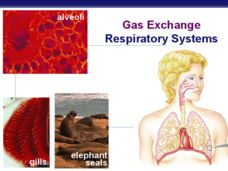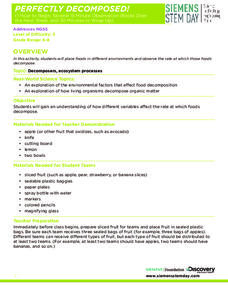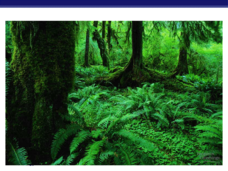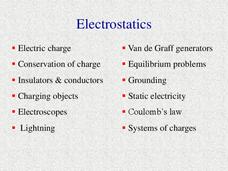Curated OER
Does Cloud Type Affect Rainfall?
Student uses MY NASA DATA to obtain precipitation and cloud type data. They create graphs of data within MY NASA DATA. They compare different cloud types as well as precipitation types. They describe graphs of the precipitation and cloud...
Curated OER
Local Weather And Location
Students explain how uneven heating of Earth affects wind and water currents. They describe the limits on current technology in predicting weather and how the Water Cycle is related to local weather.
Curated OER
Volcanic Activity in the U.S.
Students locate and map ten volcanoes in United States, create chart comparing volcanoes by last eruption, type of volcano, location, and interesting fact, and create Powerpoint slide show describing basic
information about volcanoes and...
Curated OER
Seasonal Cloud Cover Variations
Students, in groups, access data from the NASA website Live Access Server regarding seasonal cloud coverage and the type of clouds that make up the coverage. They graph the data and make correlations between types, seasons and percentages.
Curated OER
What is a Gas?
Students develop a scientific model of gas behavior. In this gas lesson plan, students observe different balloons filled with different densities of gases. They complete an activity where they model the behavior of gases using marbles, a...
Curated OER
Chemistry in Action
In this chemistry in action worksheet, high schoolers read about sulphuric acid, the use of metals, the production of titanium and the detection of chemical elements and compounds. Students are given 8 statements about what they...
Curated OER
Oscillations
Students construct and compare the actions of various pendulums. For this pendulum motion lesson, students build and test different types of pendulums. They conduct experiments with the length of the swing arm and apply mathematical...
Curated OER
Does Global Warming Increase the Intensity of Atmospheric Natural Disasters?
Students study global warming by communicating the problem, process and solutions. In this global lesson students use graphs, research and write a critical stance on natural disasters.
Consortium for Ocean Science Exploration and Engagement (COSEE)
Arctic Smorgasbord
Though the walrus spends roughly one third of its time on land, it eats organisms that live on the bottom of the ocean. The first in a series of five, the lesson uses a variety of plant and animal cards to have scholars build an arctic...
Curated OER
Design a Bobsled
Students apply their knowledge of friction, drag, mass and gravity as they design, build, and test mini-bobsleds.
NASA
The Electromagnetic Spectrum
Did you realize the visible light spectrum is less than three percent of the electromagnetic spectrum? A hands-onlesson includes five activities and experiments for scholars to explore and discover many advanced science concepts. They...
Curated OER
Engineering Lessons Adapted for Special Education
Modifying engineering lessons from NASA makes them accessible to a wider variety of learners.
Curated OER
Gas exchange: Respiratory Systems
The need for a respiratory system in humans versus being reliant on gas exchange structures is demonstrated. There are many details about the advantages and disadvantages of each mechanism. Students are able to learn about the...
Curated OER
Gas Exchange And Respiratory Systems.
Explore structures within the realm of gas exchange in terrestrial and aquatic life. The excellent, labelled diagrams and clear descriptions help your students view the different structures and adaptations that have...
American Chemical Society
Changing State: Condensation
When you have a cold drink and you notice the water forming on the outside, it is literally pulling the water from the surrounding air to form the condensation. After watching a demonstration of condensation forming on a glass,...
Cornell University
Sound Waves
How does sound travel through different mediums? Scholars explore this question by creating and observing sound waves as they learn the difference between transverse and longitudinal wave motion. Using their new knowledge, class members...
Curated OER
The Earth's Atmosphere and Temperature
Students describe and compare the layers of the atmosphere. They explain how to measure the temperature of the atmosphere and discover what causes the atmosphere to heat up in some places more than in others.
Discovery Education
Cushion It!
Sugar cubes, collide! Groups design protection systems using bubble wrap to protect sugar cubes from being destroyed by falling batteries in the STEM lesson. They consider how the experiment relates to collisions in real-world...
Curated OER
Owls: Top of a Food Chain
Although written for middle schoolers, there is no reason that a 3rd, 4th, or 5th grader could not also learn about food chains through the dissection of owl pellets. After you introduce the topic, learners complete an owl research...
Biology Junction
Cellular Respiration
Which food molecules must be present for cellular respiration to occur? Scholars view an informative presentation to better understand the process of cellular respiration. It details each step, focusing on the locations and the four main...
Discovery Education
Perfectly Decomposed!
We all know someone who won't eat the banana with a brown spot, the grape with a dimple, and the apple with a bruise. Scholars use different fruits to explore what happens when fruits really start to decompose. They set up an experiment...
Curated OER
Photosynthesis: Life from Light and Air
All aspects of the photosynthesis process, and the way that plants have adapted with specializations are detailed here. The diagrams and info-graphics will be useful to your AP biology class. It could also be used as a review...
Columbus City Schools
Photosynthesis and Respiration
Thirty percent of the world's oxygen is produced by rainforests found throughout the world. Seventh grade learners explore the processes of photosynthesis and respiration through 10 days of labs, manipulatives, and discussions. They...
Urbana School District
Electrostatics
Why did lightning shock the man? Because it didn't know how to conduct itself. Presentation covers electric charges, insulators, conductors, electroscopes, lightning, generators, grounding, static electricity, and more. Presentation...
Other popular searches
- Energy Transfer Diagrams
- Energy Transfer Ecosystem
- Heat Energy Transfer
- Transfer of Heat Energy
- Thermal Energy Transfer
- Types of Energy Transfer
- Transfer of Energy
- Transfer of Thermal Energy
- Energy Transfer Experiment
- Food Web Energy Transfer
- Energy Transfer Assessment
- Energy Transfer Wasted

























